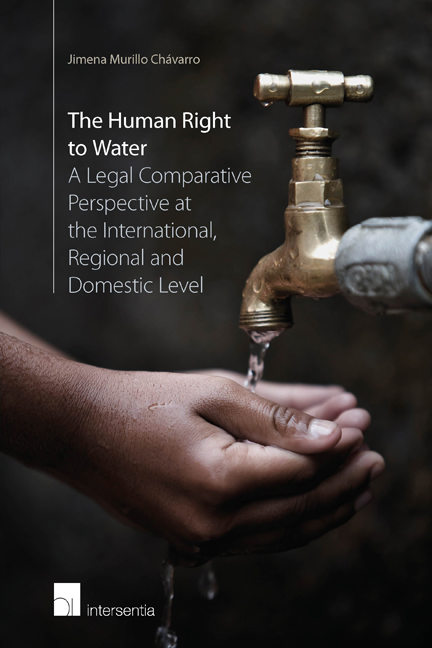 The Human Right to Water
The Human Right to Water Book contents
- Frontmatter
- Dedication
- Contents
- List of Abbreviation
- Table of Cases and Other Materials
- Table of Treaties and Other Instruments
- Chapter 1 General Introduction
- Chapter 2 Emergence, Definition and Core Content of the Human Right to Water
- Chapter 3 Recognition of the Human Right to Water at the International Level
- Chapter 4 Recognition of the Human Right to Water at the Regional Level
- Chapter 5 Recognition of the Human Right to Water at the Domestic Level: a Case Study Approach
- Chapter 6 Extraterritorial Application of the Human Right to Water in a Transboundary Watercourse Context
- Chapter 7 General Conclusions
- Bibliography
- Index
Chapter 4 - Recognition of the Human Right to Water at the Regional Level
Published online by Cambridge University Press: 15 December 2017
- Frontmatter
- Dedication
- Contents
- List of Abbreviation
- Table of Cases and Other Materials
- Table of Treaties and Other Instruments
- Chapter 1 General Introduction
- Chapter 2 Emergence, Definition and Core Content of the Human Right to Water
- Chapter 3 Recognition of the Human Right to Water at the International Level
- Chapter 4 Recognition of the Human Right to Water at the Regional Level
- Chapter 5 Recognition of the Human Right to Water at the Domestic Level: a Case Study Approach
- Chapter 6 Extraterritorial Application of the Human Right to Water in a Transboundary Watercourse Context
- Chapter 7 General Conclusions
- Bibliography
- Index
Summary
INTRODUCTION
Human rights are also being protected at the regional level where the political and cultural local circumstances are taken into account. Regional intergovernmental systems play a major role and are important to an understanding of the full range of techniques available for protecting and promoting human rights.
Currently, there are three well established and two embryonic regional systems with the purpose of promoting and protecting human rights. The well established regional human rights systems are: the European, the Inter-American and the African system, which were created by the Council of Europe, the Organisation of American States and the African Union, respectively. The two embryonic systems are being developed in the Asian and Arab regions.
One of the embryonic systems of human rights is being developed by the Association of Southeast Asian Nations (hereinafter ASEAN). This Association created the ASEAN Intergovernmental Commission on Human Rights that was charged to develop a human rights declaration. On 18 November 2012, the Association adopted the ASEAN Human Rights Declaration. Among the economic, social and cultural rights incorporated in this Declaration, the right to safe drinking water and sanitation has been explicitly included as part of a list of other rights that conform the right to an adequate standard of living. The ASEAN Intergovernmental Commission on Human Rights is responsible for the promotion and protection of human rights in the region. However, this Intergovernmental Commission is only a consultative body, which can provide advisory services and technical assistance on human rights matters. In other words this body has not been entrusted with any responsibility so as to consider complaints regarding violations of human rights.
The other evolving regional system was created under the auspices of the League of Arab States. In 1994 this organisation adopted a Charter on Human Rights; however, this Charter never entered into force. Then, as part of an effort to ‘modernise this organisation, the Charter was revised.
- Type
- Chapter
- Information
- The Human Right to WaterA Legal Comparative Perspective at the International, Regional and Domestic Level, pp. 127 - 198Publisher: IntersentiaPrint publication year: 2015


